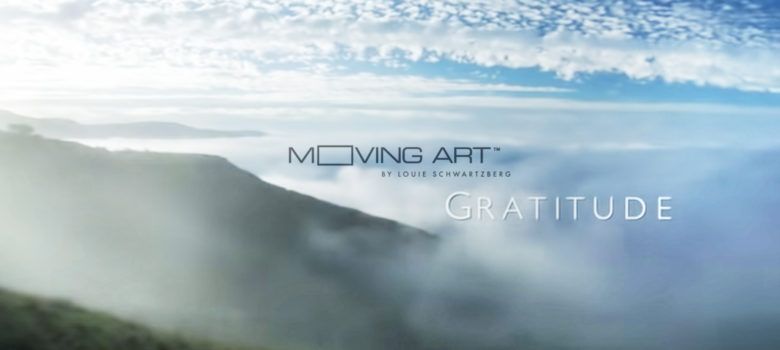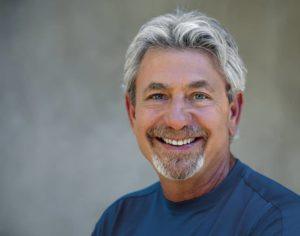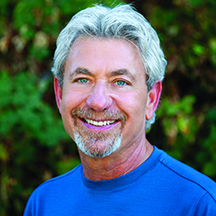

Embracing the Power of Gratitude
by Zara Jethani
A gratitude study uses beautiful videos on a mobile-based app to enhance well-being and adds to the Visual Healing® studies at Pacific Neuroscience Institute.
Can gratitude make you feel better?
“In gratitude, Louie.”

This is how award-winning filmmaker Louie Schwartzberg signs off all his correspondence. And in interacting with him, you get the sense of wonder and privilege he feels for the universe. It shows up in him and of course it shows up in his work. Watching his popular and moving short film Gratitude, it is hard not to feel immense appreciation for our natural world.
Schwartzberg, a Pacific Neuroscience Institute Foundation advisor, is working to bring his passion for gratitude and its benefits to others through his films. Last summer he launched a pilot research study that was conducted with colleagues in Canada through a citizen science pilot survey study. The study is rooted in the field of positive psychology and utilized the Quantified Citizen App to present Schwartzberg’s Visual Healing® videos. The aim was to promote feelings of gratitude over the course of two weeks with participants self-reporting their levels of well-being.
About the Gratitude Study
The Gratitude Study website states, “This informal study is investigating the effect of ‘visual healing’. Advanced research in areas of health and wellness show positive effects on health outcomes, including shorter length of stay in hospital, increased pain tolerance and decreased anxiety.” Participants are requested to test whether two weeks of daily short films about gratitude correlates with improvements in well-being.
“The fact that we’re combining these treatments is groundbreaking, as we experiment to learn how to use vision as a healing modality,” commented Schwartzberg.
Top findings of the Gratitude Study

Although this was not a conventional, controlled trial, the empirical data from this naturalistic, large, pilot study of 590 participants found positive effects of a brief two-week gratitude intervention on well-being.
The intervention was remotely delivered via a mobile app which presented daily Visual Healing® short films— 14 videos in total— created by Schwartzberg, with different gratitude themes presented each day.
Working together with the Quantified Citizen team, Pacific Neuroscience Institute’s Brain Health Center Senior Research Scientist, Dr. Sarah McEwen, and UCLA and Pacific Brain Health Center’s consultant biostatistican, Dr. Prabha Siddarth, conducted statistical analyses to look at the effect of the intervention on well-being, also looking at predictors of improvement. Subjective well-being was assessed via a self-reported well-being scale at baseline and immediately post-intervention. Retention was high, and most participants viewed >80% of the videos, showing excellent engagement with the gratitude videos. Drs. McEwen and Siddarth found the intervention was most impactful on well-being in participants aged 18-55, particularly more so in those who were unemployed.
Gratitude as a healing modality

The findings highlight how a daily passive, gratitude video-viewing intervention can psychologically benefit adults and improve their psychological well-being. Dr. McEwen stated that she and Dr. Siddarth believe this preliminary data shows initial evidence of being a proxy for stress, as shown in the examples of participant unemployment status. This hypothesis suggests wide-ranging applications and could be further explored in vulnerable populations under chronic stress, such as dementia caregivers, and those suffering from depression, anxiety, and substance abuse. These individuals may find psychological benefit from this type of brief gratitude intervention.
Leveraging gratitude through Visual Healing® in psilocybin-assisted therapy
PNI and Schwartzberg are also attempting a novel approach to mental distress and addiction by incorporating a sense of awe and gratitude using Schwartzberg’s nature-themed Visual Healing® videos into psychedelic-assisted therapy.
“We are grateful to Louie for creating and providing this beautiful film for our first psychedelic-assisted clinical trial using psilocybin to treat patients with alcohol use disorder,” said Keith Heinzerling, MD, director of the Treatment and Research in Psychedelics (TRIP) program.
For Schwartzberg, exploring and expanding the brain health benefits of his work is truly meaningful and gratifying. “In filming the clinical trials for my film Fantastic Fungi, I got the idea of bringing nature into a clinic treatment room,” said Schwartzberg. “The film I made for the PNI Visual Healing® trial was created to take people on a journey through time and scale into natural patterns and rhythms to feel the oneness, and to lose their fear by opening their hearts. That is what psilocybin does too.”
And the effect of Schwartzberg’s films does not end there, but ripples through to caregivers, medical providers, and all those that experience his Moving Art. “We are grateful for our growing collaboration with Louie both on this Gratitude project and our psychedelic-assisted therapies clinical trials,” said PNI director Daniel Kelly, MD. “As clinicians treating patients primarily in clinics and hospitals, we often forget the potential for nature-based healing. Louie has a unique ability to remind us of this connection we all have but too often forget.”
About Louie Schwartzberg

Louie Schwartzberg is an award-winning cinematographer, director, and producer whose career spans more than four decades of providing breathtaking imagery using his time-lapse, high-speed, and macro cinematography techniques. He tells stories that celebrate life and reveal the mysteries and wisdom of nature, people and places. Louie has been seen on Oprah’s Super Soul Sunday. His TED talks are among the most viewed of all times and have touched millions of people. He has at spoken NASA, Global Spa and Wellness Summit, The Nantucket Project and Bioneers. He has won two Clio awards for Best Environmental Public Service Spots. His gorgeous films on nature’s beauty invite us to find the beauty and gratitude in every moment. movingart.com
About Dr. Sarah McEwen

Sarah McEwen, PhD, NSCA-CPT, is a Cognitive Psychologist and Senior Research Scientist at the Pacific Brain Health Center, at Pacific Neuroscience Institute in Santa Monica, California. Her specialty is the study of physical activity and cognitive enhancement interventions to investigate biological, behavioral, and health-related outcomes in patients suffering from cognitively debilitating disorders.
About TRIP

The Pacific Treatment & Research in Psychedelics (TRIP) Program is dedicated to the development of psychedelic-assisted therapies and the scientific exploration of how altered states of consciousness can be harnessed to change behavior and improve brain health and quality of life.
Useful Links
- The Gratitude Study
- Treatment & Research in Psychedelics (TRIP)
- Pacific Brain Health Center | 310-582-7641
Moving Art videos and images used by permission of Louie Schwartzberg
About the Author

Zara Jethani
Zara is the marketing director at Pacific Neuroscience Institute. Her background is in molecular genetics research and healthcare marketing. In addition, she is a graphic designer with more than 20 years experience in the healthcare, education and entertainment industries.
Last updated: April 15th, 2021
